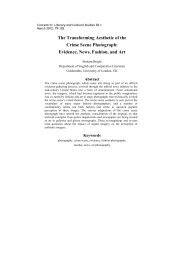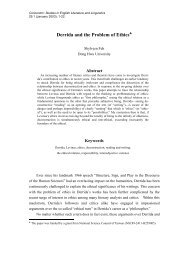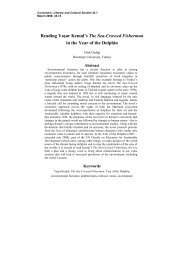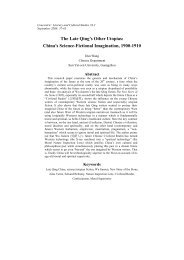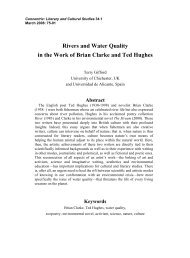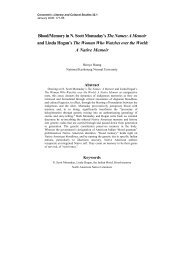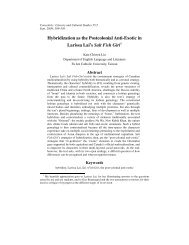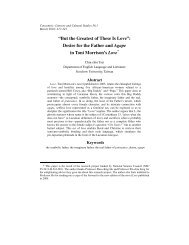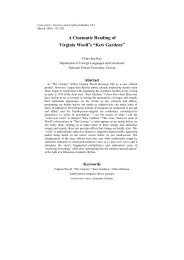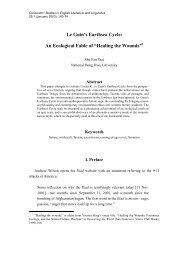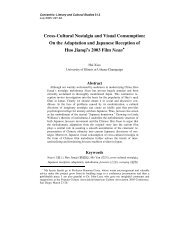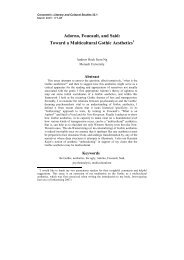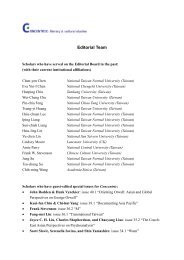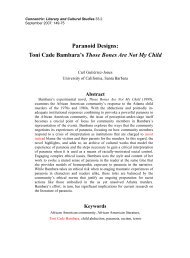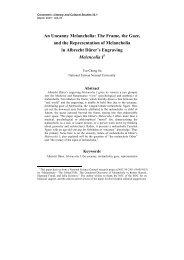The Gaze of the Other in Ang Lee's Crouching Tiger ... - Concentric
The Gaze of the Other in Ang Lee's Crouching Tiger ... - Concentric
The Gaze of the Other in Ang Lee's Crouching Tiger ... - Concentric
Create successful ePaper yourself
Turn your PDF publications into a flip-book with our unique Google optimized e-Paper software.
187<br />
Tsai: Crouch<strong>in</strong>g <strong>Tiger</strong> and <strong>The</strong> Birds<br />
“himself” (“herself”) as <strong>the</strong> image or “o<strong>the</strong>r” reflected <strong>in</strong> <strong>the</strong> mirror, that is, as a k<strong>in</strong>d<br />
<strong>of</strong> “lack” or “difference”—we have “homeomorphic” identification and<br />
“heteromorphic” identification (Écrits 3). <strong>The</strong> former is related to <strong>the</strong> Lacanian “eye,”<br />
<strong>the</strong> latter to <strong>the</strong> “gaze.” Unlike Sartre, who conflates <strong>the</strong> gaze with “<strong>the</strong> act <strong>of</strong><br />
look<strong>in</strong>g,” Lacan dist<strong>in</strong>guishes “eye” and “gaze” and ties <strong>the</strong> latter to “<strong>the</strong> object <strong>of</strong> <strong>the</strong><br />
act <strong>of</strong> look<strong>in</strong>g” (Evans 72). In <strong>the</strong> scopic field <strong>the</strong>re is not completely symmetrical<br />
reciprocity <strong>of</strong> seer-seen: “when <strong>the</strong> subject looks at an object, <strong>the</strong> object is always<br />
already gaz<strong>in</strong>g back at <strong>the</strong> subject, but from a po<strong>in</strong>t at which <strong>the</strong> subject cannot see it”<br />
(Evans 72). Looked at <strong>in</strong> this way “self-identity” is fluid, subject to <strong>the</strong> <strong>in</strong>teraction<br />
between self and o<strong>the</strong>r. Identity as a self-sufficient, autonomous, sacrosanct entity—as<br />
one term <strong>in</strong> a stable self-o<strong>the</strong>r dialectical polarity—becomes problematic now that <strong>the</strong><br />
o<strong>the</strong>r (as perhaps predicted by Hegelian pure negativity) appears as an “event.”<br />
With Lev<strong>in</strong>as, who is <strong>in</strong>fluenced by Kierkegaard’s post-Hegelian concern with<br />
God’s absolute “command” to Abraham (<strong>the</strong> non-logical or absurd command <strong>of</strong> an<br />
absolute O<strong>the</strong>r), we get <strong>the</strong> notion <strong>of</strong> <strong>the</strong> o<strong>the</strong>r as demand, <strong>the</strong> demand for a (for its<br />
own) “space <strong>of</strong> enunciation.” This demand is “<strong>the</strong> call <strong>of</strong> <strong>the</strong> O<strong>the</strong>r” as <strong>the</strong> “articulat<strong>in</strong>g<br />
[<strong>of</strong>] a need” (Evans 34-35). From a Lev<strong>in</strong>asian perspective, <strong>the</strong>n, <strong>the</strong> relationship<br />
between self and o<strong>the</strong>r is not dialectical but properly ethical s<strong>in</strong>ce <strong>the</strong> o<strong>the</strong>r is now seen<br />
as one’s neighbor, one’s “fellow man” whose demand on us (on our own “subjectivity”)<br />
“signifies o<strong>the</strong>rwise than as […] present<strong>in</strong>g essence and entities” <strong>in</strong> <strong>the</strong> old Hegelian<br />
way (O<strong>the</strong>rwise 46). <strong>The</strong>refore <strong>the</strong> self (our self, myself) can no longer essentialize <strong>the</strong><br />
consciousness <strong>of</strong> <strong>the</strong> O<strong>the</strong>r or reduce it to <strong>the</strong> “I th<strong>in</strong>k.” In speak<strong>in</strong>g, communicat<strong>in</strong>g,<br />
“say<strong>in</strong>g,” we close <strong>the</strong> self-o<strong>the</strong>r distance: “[t]o say is to approach a neighbor” (48).<br />
Though say<strong>in</strong>g is communication, <strong>the</strong>n, this cannot be reduced to a phenomenology <strong>of</strong><br />
truth. <strong>The</strong> “subject” is no longer <strong>in</strong>, at home with, “himself”—like <strong>the</strong> “say<strong>in</strong>g” which<br />
answers <strong>the</strong> o<strong>the</strong>r’s demand <strong>the</strong> subject becomes now a k<strong>in</strong>d <strong>of</strong> passive force, an<br />
existence-for-<strong>the</strong>-o<strong>the</strong>r that is free <strong>of</strong> <strong>in</strong>tentionality, cognition, representation, horizon,<br />
and <strong>in</strong>teriority.: “An exposure to <strong>the</strong> o<strong>the</strong>r […] <strong>the</strong>-one-for-<strong>the</strong>-o<strong>the</strong>r to <strong>the</strong> po<strong>in</strong>t <strong>of</strong><br />
substitution, but a substitution <strong>in</strong> separation, that is, responsibility” (54). In<br />
communication, “[a]lterity comes to me [<strong>the</strong> self] from without, and comes by<br />
exceed<strong>in</strong>g my capacities” (O<strong>the</strong>rwise 4). <strong>The</strong> world <strong>of</strong> self is <strong>the</strong> world <strong>of</strong> Da [<strong>The</strong>re].<br />
It is a world <strong>of</strong> existence without existants, a transcendence and a pass<strong>in</strong>g over end<strong>in</strong>g<br />
at be<strong>in</strong>gs’ o<strong>the</strong>r (O<strong>the</strong>rwise 3).<br />
Lev<strong>in</strong>as critiques not only <strong>the</strong> Cartesian-Kantian-Hegelian tradition <strong>in</strong> Western<br />
philosophy, built on notions <strong>of</strong> ego and reason associated with light and knowledge,



